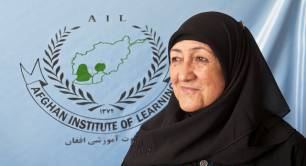Collection: The Accidental Social Entrepreneur
10 social innovation discoveries you should know about
Over the next few months, we'll be travelling across China and India, and to Myanmar with the British Council to explore social innovation across the globe.
People worldwide are pulling together to create change in their communities, nations and the world at large. It’s high time we took a look at what's going on out there, says Paula Woodman, kicking off the series with 10 eye-opening discoveries.
I thought I was a native in the land of social enterprise, until in 2012 I joined the British Council. Social enterprise holds many new surprises when seen through the lens of a global organisation present in 110 countries. It is a space full of opportunity to collaborate and trade, think bigger and more boldly, and find renewed purpose and inspiration. It's a world worth exploring for everyone looking to create meaningful change, and to make a start, here are 10 eye-opening discoveries that I've made working with social enterprises across the globe...
1. Social enterprise has reached immense scale in Bangladesh...
BRAC is the biggest social enterprise conglomerate you’ve never heard of. Founded in the mountains of Bangladesh in 1972, it now operates in 10 countries in Asia, Africa and the Caribbean having an impact on the lives of 135 million people. Its social enterprise activities alone posted a turnover of £95m in 2012. BRAC supports inclusive development through an array of initiatives including microfinance, education, healthcare and legal services. Its diverse and wonderful portfolio includes fairtrade Aarong, one of Bangladesh’s largest fashion chains.
2. Social entrepreneurs dig in to support indigenous communities 'down under'...
In Australia, the British Council is part of a social enterprise ‘precinct’ where proposed activities include the extractive industries. The project involves the North Australian Indigenous Land and Sea Management Alliance Ltd (NAILSMA) which supports Indigenous people to manage their country sustainably. The company has undertaken over £17m worth of large-scale and complex projects to produce cultural, environmental and economic benefits for Indigenous people.
3. French pioneers demonstrate how social enterprise can trade globally...
According to Social Enterprise UK’s latest survey, 11% of UK social enterprises are trading internationally, with newer social enterprises more likely to export or license overseas than older ones. However, early indications are that this cross border trade only accounts for 10% of these enterprises’ total turnover and that it’s mostly concentrated in Europe. Social enterprise pioneers elsewhere are showing how international trade can be done. France-based Groupe SOS, for example, is active in over 30 countries, employs 10,000 staff and directly benefits over 1 million people.
4. Political disinterest isn't stopping female social entrepreneurs in India...
The need for public sector reform in the UK creates a lot of political interest in supporting social enterprise. For much of the developing world that motive is not there - provision of public services already involves a large contribution by civil society organisations.) – and policies to pro-actively support social enterprise often progress at a slower pace. In India, where we have just launched an initiative to train 1,000 women social entrepreneurs, social enterprises are thriving in the absence of reform, delivering services the government is unable to provide. Deval Sanghavi, who heads a social investment intermediary in Mumbai, told INSEAD’s Knowledge magazine: “Social entrepreneurship in India is emerging primarily because of what the government has not been able to do. The government is very keen on promoting social entrepreneurship – not necessarily by funding it or by advising on it or enabling it. What they do do, is not disable it.”
5. Newcomers like Thailand are sprinting with the social enterprise baton...
Several countries that are new to social enterprise are developing at speed, adapting ideas gathered from the UK and other countries. Take Thailand, for instance. In 2010, the British Council organised a study tour to the UK for Thai government officials. They met with social entrepreneurs, with supporting bodies and with policy makers to understand how Britain created a fertile environment for social enterprise. Inspired by what they saw, these officials established a National Social Enterprise Committee, which established the Thailand Social Enterprise Office – modelled on Social Enterprise UK – and published a Social Enterprises Master Plan (2010-14). This blueprint included a provision for a £1.7 bn Village Fund Programme, the world’s second largest microcredit scheme, to spark the creation of community enterprises and provide seed money for small businesses.
6. Social entrepreneurs are supporting Myanmar's recovery from tyranny...
In countries like Myanmar that have been racked by dictatorship and civil war, the nascent social enterprise movement is helping to rebuild civil society. “Among the greatest assets of the social enterprise 'movement' are its diversity and ability to build connections across sectors,” said Tristan Ace, our project manager on the ground in Myanmar, on the launch of the first study into social enterprise in the country. Social enterprise offers an opportunity to overcome the disillusionment around the role of government and business in recent decades. And by involving these diverse actors, it also supports the effort of building inclusivity and sustainability into the economy when foreign investors and donors are rushing into this frontier market.
7. Social investment is taking off in China and Vietnam...
While we are still teasing out issues involved in social investment, the concept is taking root and capturing the imagination in China, where the British Council found seven local partners with an appetite for social investment. Together we have launched a new Social Investment Platform to promote impact investing in China and provide training and funding opportunities to outstanding Chinese social enterprises. With RMB 9mn available in investment funding, the new platform will connect social enterprises and social investors, and involve a national business plan competition.
Similarly in Vietnam we attracted a strong cohort of local partners with a desire to explore social investment for the benefit of Vietnam, including the Vietnam Chamber of Commerce and Industry. Together we held the country's first Social Investment Forum in late August, attracting over 150 policy-makers, investors, social entrepreneurs and representatives from aid agencies and intermediary organisations
8. Social entrepreneurs are connecting from Scotland to South Korea...
The Social Enterprise World Forum realised the need to build a global movement back in 2007. I was at the first event in Edinburgh and was lucky to be in Canada this year, with a small group of people from the UK. In drawing 1,000 attendees from 30 countries – a new record – who spoke a shared language of social enterprise, the event underscored how much the global movement has grown. Canadian delegates spoke of the catalysing impact it had on the movement in that country and next year’s event in Seoul promises to further infuse new strategies, new ideas and new momentum. We need to build on these exciting global gatherings, developing other activities and opportunities to share and connect globally on a host of issues.
9. The United Nations is getting serious about connecting economic activity and social justice...
Following the UN’s first conference on the subject, the UN has now established an Inter-Agency Task Force on Social and Solidarity Economy (SSE). The aim is to assist countries to mobilise political will and generate momentum for mainstreaming the issue of SSE in international and national policy frameworks. As with the term ‘social enterprise’, definitions for the ‘social and solidarity economy’ remain a subject of conversation, although the UN states that it involves explicit economic and social objectives: “they reconnect economic activity with ethical values and social justice”.
10. Social entrepreneurs are in training and partnering up worldwide...
This isn’t an advertorial. I have been genuinely surprised with the extent of the British Council’s work on social enterprise. Piloted in 2008, the British Council’s Global Social Enterprise programme was active in 13 countries in 2012-13. Drawing on UK experience and expertise, the programme has trained over 4,200 social entrepreneurs and helped social enterprise to take root and blossom in countries such as China.
Looking to the future two things are clear: 1) the programme will grow – we have new corporate support to boost our work, and are experiencing rapidly growing interest from British Council countries and regions, and 2) the programme will continue to build new partnerships with organisations that believe, like us, that social enterprise and social investment are catalysts for more sustainable and inclusive economies and societies.
The British Council is the UK’s international organisation for educational opportunities and cultural relations, working on the ground in six continents and over 100 countries.
Photo by Linh Nguyen

![[file:field_file_image_alt_text]](https://www.pioneerspost.com/sites/default/files/styles/node-teaser/public/images/article/general-1_0.jpg?itok=zFNngRUo)

